I live on the outskirts of a small town. It’s out of the way.
Whenever I listen to the traffic report on the news, I wonder if people who are stuck in congestion in the bigger cities like Auckland or Wellington can imagine how different it is where I live?
New Zealand is often condescendingly described as a small island a long way from anywhere.
Is it, though?
When we overlay them against other more recognisable land masses, Te Ika-a-Māui and Te Waipounamu are revealed to be much larger than most of us realise.1
For example…
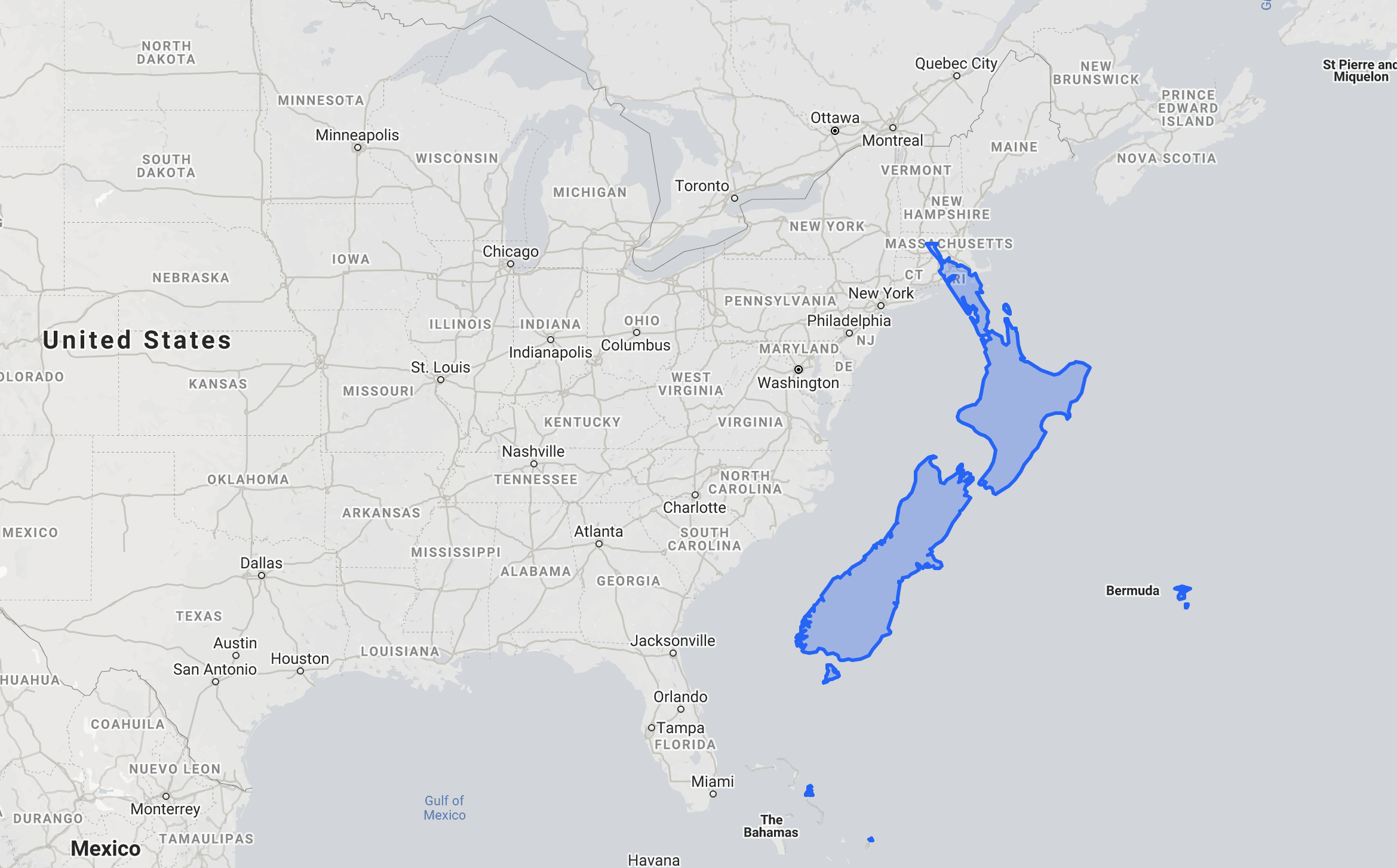
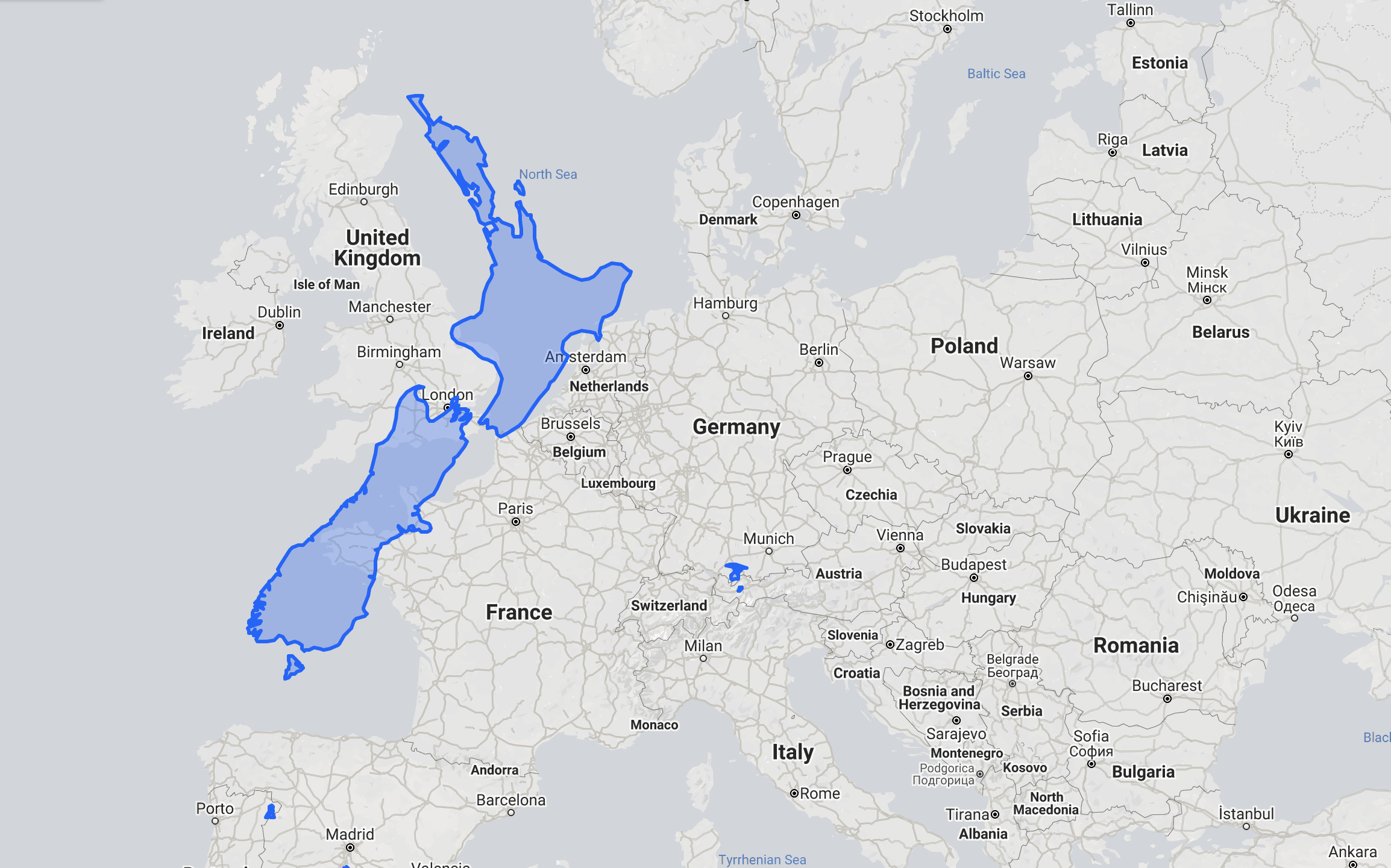
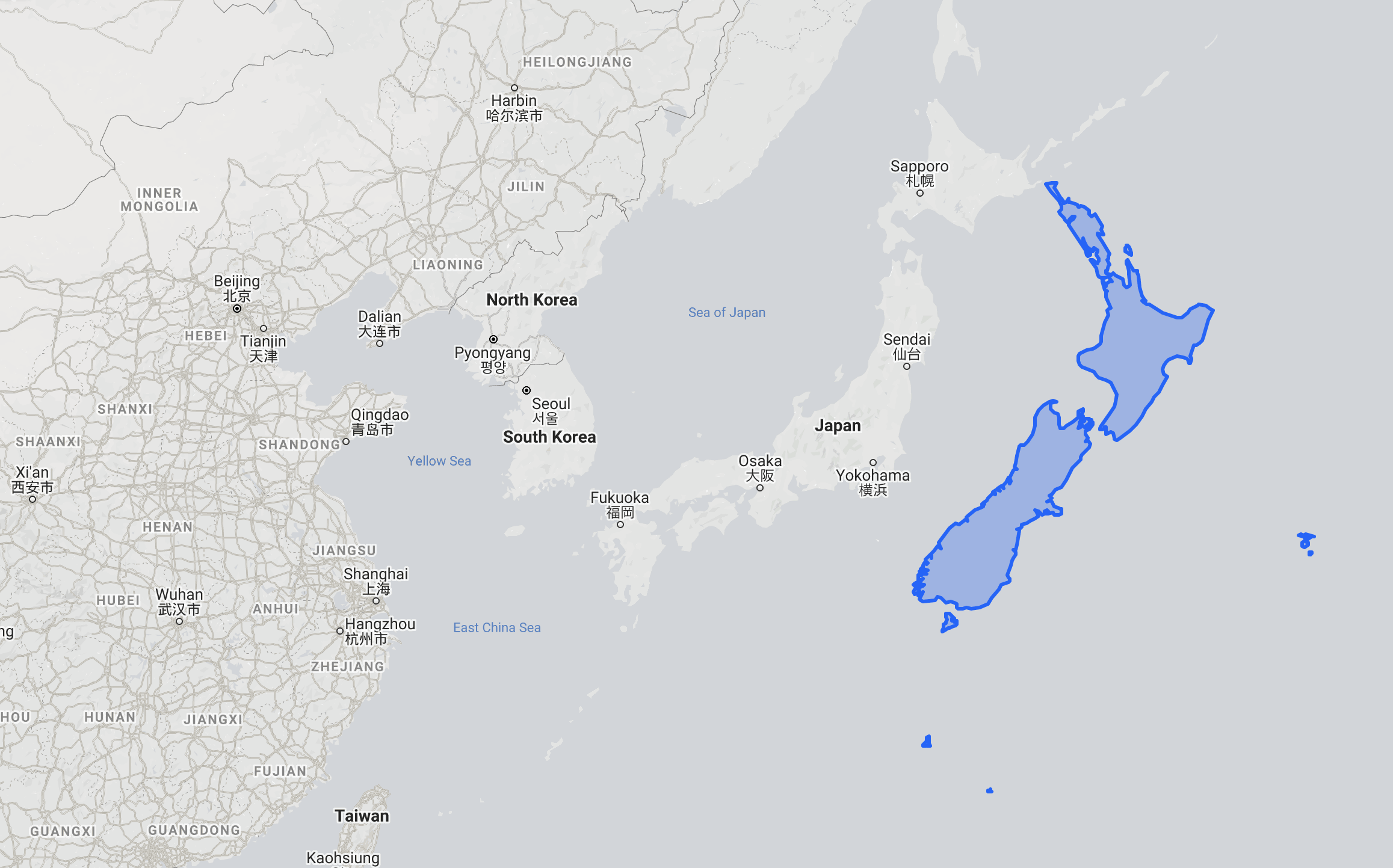
Source: Epic Maps
When we look at it this way we’re forced to admit: we’re not small at all, just very lightly populated, at least compared to those examples.
What do people living elsewhere in the world imagine life is like here? I assume they are a lot like Aucklanders stuck on the Southern Motorway in the morning rush hour.
We’re not a long way from anywhere, in the middle of nowhere, unless you believe right here isn’t somewhere.
I wish we would lean into this. Rather than resigning ourselves to the “tyranny of distance”, how could we re-frame this to highlight the advantages?
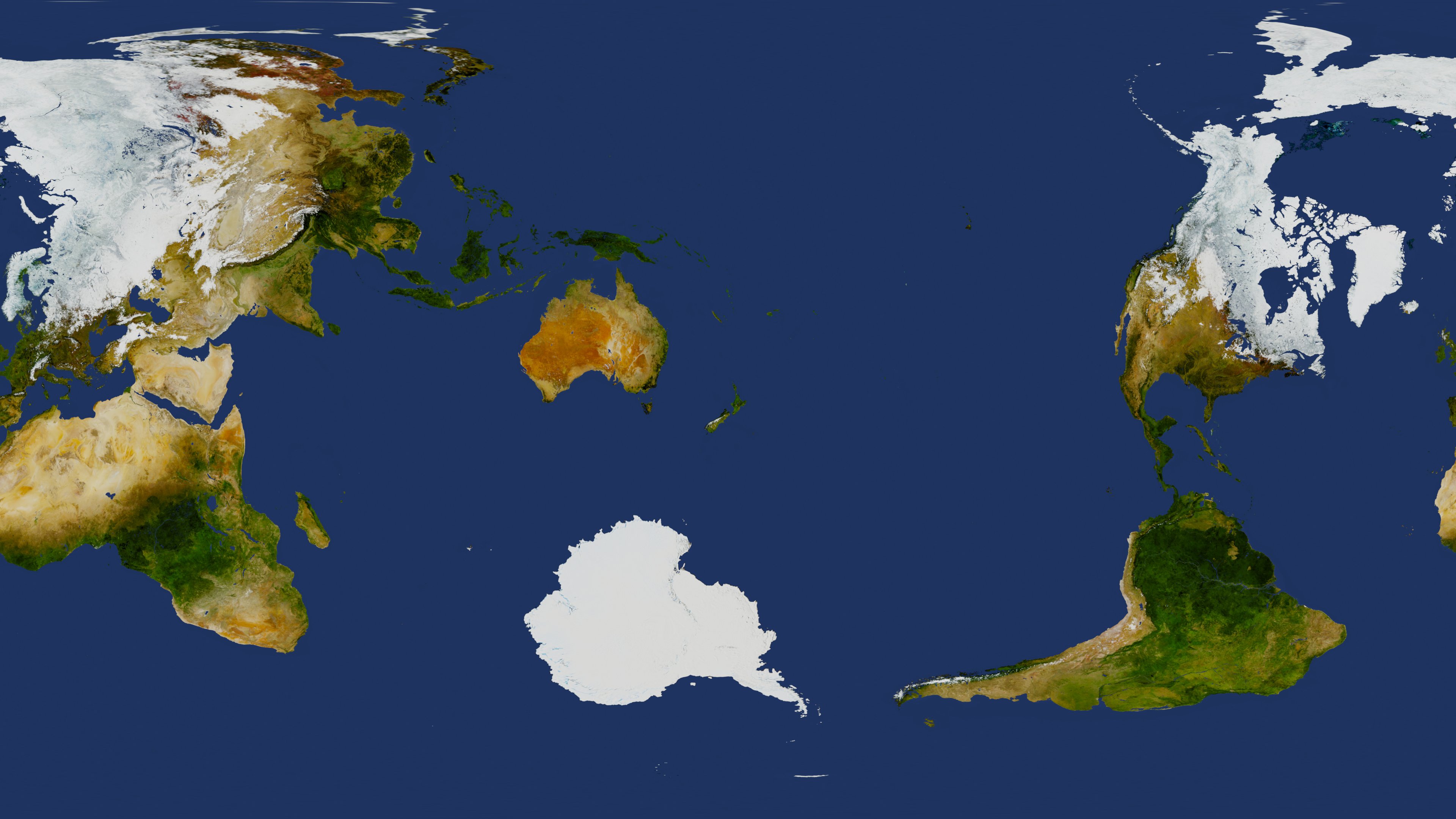
The biggest small country
Here is one idea…
Our tiny population means that the theory of six degrees of separation breaks down completely. The number of connections you need to traverse in order to get in contact with anybody is typically much smaller - maybe two or three at most.
Metcalfe's Law says “the value of a network is proportional to the square of the number of people connected to the network”. That would suggest that our tight connectedness is really valuable.
It makes us more open and accessible, less likely to be locked away in our own gated communities or stuck out of sight in a negative situation we are unable to escape. Anybody who might be inclined to hide can’t do that for long, and those that need help are not so easily ignored.
It makes us less reliant on the social cues that are vital elsewhere - like where you went to school or what job you have - because we can just ask others who know and quickly find out what somebody is really like.
It encourages good behaviour. Anybody who is a dickhead can reasonably expect to get exposed pretty quickly.
It is reflected back to us in statistics like the low levels of corruption and high levels of trust in our democratic system.2 It contributes to the ease of doing business.3
Of course, those things are not universally true. We should all be motivated to preserve and extend them to everybody, because they are some of the things that make us unique.
Perhaps we should stop thinking of Aotearoa as just a small country and instead position ourselves as a big small country. Perhaps the biggest small country!
That would at least force us to find a better aspiration than “punching above our weight”.
From the biggest the most is expected, right?
What is the constraint?
Every founder who has ever asked me for advice about their startup will be familiar with my favourite question:
What is the constraint?
It’s a great way to identify the most useful things to talk about, to dig into the specific areas of the business and to understand what could unlock growth.
More often than not the answer is related to people - i.e. how to manage the existing team so they perform to their potential, and how to grow the team without wrecking the culture.
This same idea applies at the ecosystem level.
How do we identify and remove the systemic constraints that make it difficult for ventures to start and scale?
For many years the noise from founders complaining about how difficult it is to find investors has drowned out the much smaller but ultimately much more interesting group of founders who successfully raise investment and, as a consequence, bump into a whole different set of constraints.4
When we ask them what’s holding them back they nearly all point to the challenges of finding and keeping great people in their team.
Those of us who invest in startups sometimes like to imagine we are funding “innovation” (with a hand wave). We need to peel the onion and think about how invested capital is spent. When we cut through the aspirational language, in practice, funding innovation nearly always means funding payroll. Even hardware startups, with significant capital costs, spend a large portion of the money they raise on people.
Raising capital allows founders to create new roles, but filling them with capable people and keeping them filled is still hard work, and cash is only one part of the solution. It’s tempting to think that startups are about having a great idea, but in the end they are about being great at recruitment. I would add to that: being even better at retention.
More and more, high-growth startups in New Zealand are either forced to poach staff from each other or hire remotely. That’s not a sign of a vibrant ecosystem.
How do we remove that constraint? Where else could these people come from?
Train
The need for more qualified people to work on these businesses has been well sign-posted for many years.
But you might not guess that by looking at the statistics.
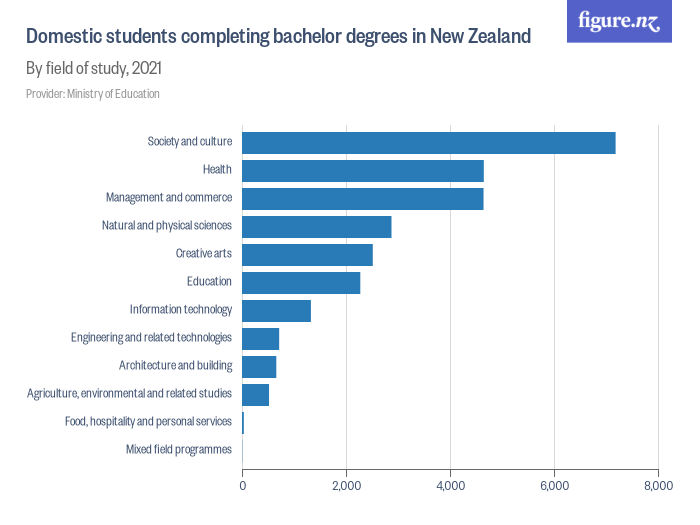
In the last decade the number of people completing Information Technology or Engineering degrees has roughly doubled. The number completing Science degrees has increased by only ~20%. If more of us could calculate compound growth rates we’d understand how insufficient those results are.
Worse, both of those increases are from a very small base. The raw numbers are depressingly low when we compare the number of graduates to the number of currently unfilled roles and future requirements:
Science: 2,875 graduates
Information Technology: 1,325 graduates
Engineering: 715 graduates
If you look at the trends over time for these three different areas of study combined, the total number of students enrolled peaked in 2015, when there were ~54,000 students. By 2020 that number had fallen to just over 50,000, 4% fewer than there were way back in 2011. By comparison in 2020 there were ~14,400 students studying law and ~11,700 studying accountancy.5
It’s even worse further down the pipeline, where the number of secondary school students completing NCEA technology standards dropped from 52,504 students in 2015 to 48,024 in 2019.6
And it’s not just engineers that are scarce. We are also drastically short of sales and marketing people with experience selling the type of products that startups here are building.7
We sometimes repeat Sir Paul Callaghan’s formula:
Just one hundred inspired entrepreneurs could turn this country around.
But we overlook that each of those founders, if they are going to build a great business, will each need to hire hundreds of qualified people.
Sadly, I don’t have an easy solution to this. I doubt there is a silver bullet. The nature of this problem means there isn’t one big initiative that will unlock this. It will require hundreds of initiatives each contributing in a small way.
Remember, the one thing we need to do is stop believing in silver bullets.
However, I can at least state the problem clearly: We need to train many more people than we currently do.
We need to stop assuming that a small group of people make the difference. We need to dig below the headline names and share the stories of all of the people who are doing the heavy lifting and building these high-growth companies. And in the process, hopefully inspire many others to consider doing the same.
Import
Another obvious potential solution is to convince qualified people from overseas to relocate.
Again, there is a relevant Sir Paul Callaghan catch phrase. He said we should aim to:
Be the place where talent wants to live
But what does that actually mean?
Remember, people aren’t “talent” or “heads” or “resources”. People have talents.
We should focus on the lifestyle that all of us who choose to live here enjoy, and why that might be attractive to other talented people from elsewhere.
Our global reputation as a place where qualified people might want to live and work has probably never been better. But the key to unlocking this at scale is our immigration settings, and this is not simple.
If we look at some examples of the specific initiatives we’ve used in the past, there is not great evidence that they have addressed the constraint we’re talking about at all:
Investor Visas
We’ve fallen into the trap of promoting ourselves as a comfortable place to retire for people who are at the end of a successful career, rather than a place that attracts people who are still hungry to build new businesses.
Next time you read that New Zealand needs to incentivise successful entrepreneurs from overseas to relocate, I’d like you to imagine we are the owners of a second-division French Rugby club, who continue to believe that the key to success is signing another soon-to-retire All Black or Springbok.8
Somebody who has been successful overseas needs to invest just NZ$15 million to effectively buy a visa. There is no requirement that these investments go specifically into growth businesses.
Incredibly, anybody who does want to invest in growth businesses is directed to the Angel Association. I’m honestly not sure who decides that we don’t already have enough angel investors and so need to import them? Once again, the myth about our shortage of capital seems to have distorted our decision making.
MBIE claims that wealthy individuals using this scheme provide “hundreds of millions in direct investment, job creation and skills”.9
I’d love to know how this is assessed in advance, and what feedback loops are in place to determine if people who are given these visas ever deliver what they promise. How many jobs are created and filled? How are their skills actually applied?
In other words, does it work?
This scheme was temporarily suspended during the COVID-19 border closures. News that the scheme was opening up again must have provided welcome relief to real estate agents in Queenstown.10
Global Impact Visas
A separate scheme was established in 2016, enabled by the government but outsourced to a private group called Edmund Hilary Fellowship to implement.11
The cabinet paper making the case back in 2015 admitted that the pre-existing Entrepreneur Visa, while “working well”, wasn’t “designed to bring in the more innovative, global entrepreneurs needed to support the growth of New Zealand’s innovation system”.12
This begs the question: what was the Entrepreneur Visa designed to do, and on what basis was it working well?
The proposal seemed smart: target younger founders with a greater appetite for risk, who don’t qualify for other visas (mostly because of the financial criteria).
Is it working?
The results seem mixed. As always, when success depends on picking winners the outcome depends on who we allow to do the picking.
There are anecdotal examples of individuals in the scheme making a significant contribution. The year three evaluation report published by MBIE notes: 13
The direction of travel is positive and the potential for future outcomes is strong
But also:
Ecosystem stakeholders have mixed views about whether the scale and type of outcomes they have observed from the pilot to date are in line with their expectations. Some fellows are also underwhelmed by the aggregate outcomes that the pilot has delivered to date.
The report also makes it clear that the pilot was significantly impacted by COVID-19. In fact, international fellows were unable to enter the country at all while borders were shut.
Perhaps most importantly:
To date there has been limited alignment of the pilot to other government initiatives that seek to address innovation.
And:
While the pilot does have some accountability mechanisms, the lack of interim targets for output and outcome measures has made it difficult to track progress.
Many of the fellows seem to have been selected for their current celebrity rather than their deep commitment to living in New Zealand and contributing directly to local ventures.14
That seems like a big missed opportunity. If we are not clear about who we intend to help, what constraint they have and how we hope to reduce or remove that constraint, then we will struggle to demonstrate any impact.
Unfortunately this seems like another policy initiative that was captured by derivatives in the ecosystem, rather than directly targeting startup companies and the constraints they have:
The resulting policy reflects what the market is seeking, including potential applicants and potential host communities (business and innovation hubs, regional authorities, economic development agencies, etc)
If that’s our definition of “the market” then of course the solutions we implemented were distorted. We’ve got to stop falling into this trap and start talking directly to the companies that need to hire these people.
Of course, the implicit challenge when we talk about importing talent is that talent can also be exported.
In the past we have worried about a “brain drain” when qualified people leave to take up bigger and better opportunities working overseas. That was paused and reversed during the pandemic, but we shouldn’t be surprised that it’s resumed again as borders open.
However, just as we can export software without having to physically ship anything around the world, we can also export software development without having to physically relocate ourselves. Smart developers and designers based in New Zealand can now tap into a global market for their skills, and if they prefer, easily work remotely as part of international teams. This is the best of both worlds - they can live here, enjoy the benefits New Zealand has to offer, and still earn an international salary. But it does shine a spotlight on what those benefits really are.
The effects of this change on local teams will be huge and is only just starting to be noticed.
Release
A third option, that doesn’t get anywhere near as much airtime as those previous two:
We can rescue people from corporate servitude.
I joke, but only a little.
I’ve noticed that once people have experienced working in a high-growth company there are very few who choose to go back into a corporate or government job. And those that do often don’t last long before they jump again into an environment where the outcome is far less certain and so their ability to influence the outcome and benefit from that is so much greater. It’s addictive!
Why don’t more people do this?
I wonder if the dominant narrative about startups is again partly to blame. If you’re working in a secure corporate job and everything you see about startups looks like a reality television show - incubators and accelerators and demo days and startup weekends etc - then it’s easy to assume it’s all a bit of a game, and not a serious career option. As a consequence, it’s not until high-growth companies get much bigger (i.e. when they start to become small corporates themselves) that they start to attract these people as team members. By then the opportunities to learn all the lessons from a high-growth stage are missed.
To convince more people to take the risk on a role in a startup we have to do a better job of demonstrating the opportunities that exist in actual high-growth and early-stage startups, rather than just banging the ecosystem drum louder and louder.
If you’re one of these people: be more curious. There are so many interesting and different jobs available at companies that you’ve probably never heard of. The biggest problem they have is attracting people with useful experience to join their team. Because they are growing quickly the range of things you’ll be exposed to will blow your mind wide open, and with that comes amazing career opportunities in the future. What have you got to lose really? Even if the first team you choose doesn’t work out, you won’t look back.
Look!
Last but not least (probably most) we can all do a much better job of hiring a more diverse range of people into startups. It’s difficult to claim that our biggest constraint is recruitment when our startup teams are filled with predominantly young white bearded men.
This is a pattern that is repeated too often: the first few people to join a startup team all look quite similar to each other. The reasons for this are usually innocent: they normally know the founder and might be the only people prepared to take the massive risk involved in being the first believer. Then, when the team expands, those people hire their friends. When we are operating at pace this can seem like the easiest option, and it’s a common mistake. However, once that pattern has been repeated a few times we end up with a monochrome team and a culture that is unlikely to appeal to anybody who doesn’t fit that mould in the future.
When we consider the companies that are most successful they tend to have much more diverse teams. That’s not an accident or a coincidence. To win we need to build teams that work together like rugby teams not rowing squads.
Despite these challenges, it is a hopeful time. I can tell lots of stories of astonishingly competent people who have started or worked on amazing ventures. I’ve been incredibly fortunate to have some of them as colleagues over the years. Some of them were born and educated here. Some have come from overseas to base themselves here. They make this a better place.
But there are just not enough. We need more. We need many more.
Until then, this will continue to hold us back from growing more of these types of businesses, with all the collective benefits that would bring.
We need to be honest about our actual constraints.
-
Maps generated by The True Size ↩︎
-
New Zealanders Place High Trust In Our Democratic System, Research New Zealand, 22 November 2020. ↩︎
-
Doing Business Report, World Bank, 2020. ↩︎
-
This tweet of mine, from 2014, remains frustratingly evergreen:
↩︎Stop thinking that capital is the constraint to more high-growth kiwi companies. Every company I’m invested in can’t hire enough people.
-
Education Counts, Education Counts. ↩︎
-
Digital Skills Survey, Scoop, February 2021. ↩︎
-
Detailed analysis on this would teach us a lot. For example, tracking how the increase in graduates across these categories has flowed into employment, and specifically into which companies (i.e. are these people taking jobs in high-growth businesses or more mature businesses)? ↩︎
-
Does importing foreign players at the end of their career even work for sports teams? I can’t find any data for rugby clubs specifically, however research shows foreign players do improve short-term results for European football clubs, but it is financially unsustainable unless the owner is a Russian oligarch or Saudi prince. And it also reduces opportunities for local players. ↩︎
-
Wealthy investors due to arrive on new border exemption, Radio NZ, 17th May 2021. ↩︎
-
Border exemptions: Visas approved for 14 wealthy investors, Radio NZ, 4th July 2021. ↩︎
-
Global Impact Visa Program Briefing Papers, Stuff (via OIA request). ↩︎
-
Global Impact Visa Evaluation, Year 3 Final Report by Martin Jenkins, MBIE, March 2021. ↩︎
-
The curious world of New Frontiers by David Farrier, The Spinoff, 29th January 2020. ↩︎
Related Essays
Machines & Phases
There are so many different ways to measure a startup. It’s easy to drown in metrics. How do we separate the signal from the noise?
How to Get Old
We only get to be each age once. How many will we waste trying to be something that we’re not?
Building An Ecosystem
How can we build an ecosystem of innovative technology startups in New Zealand?
Derivatives
How do all of the programs designed to support startups actually help?
Monochrome
What can rugby teams and rowing squads teach us about building and managing diverse teams?